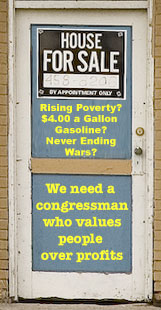
Hawkins Rejects Senate Bailout Bill as "Pork Barrel Politics"
Howie Hawkins for Congress
25th District, New York
www.howiehawkins.org
Media Release
For Immediate Release: Thursday, October 2, 2008
For More Information: Howie Hawkins, 315-425-1019, hhawkins@igc.org
Howie Hawkins, the Green Populist candidate for Congress in the 25th District, said today that the US Senate version of the Wall Street bailout package adopted by the US Senate Wednesday night was "pork barrel politics at its worst."
Hawkins said Senate's bill was worse than the one the House rejected on Monday and urged the House to reject the Senate version as well. Congressional leaders hope to bring the bill up for a House vote on Friday.
"Changing its name from bailout to rescue doesn't change the fact that the new bill remains a $700 billion giveaway to Wall Street, only now it's larded up with tons of pork and special interest tax breaks that raise the total cost to $810 billion. The leaders of the two ruling parties aren't solving the financial crisis. They are engaged in the old corrupt game of buying one vote at a time with pork barrel spending. They are giving their Wall Street paymasters, who have contributed $2 billion in campaign contributions to the ruling parties since 1990, what they paid for: the best politicians money can buy. This isn't democracy; it's legalized bribery," noted Hawkins.
"The American people demanded changes to help people stay in their home, to rebuild the economy, and to protect the public against financial swindles, while making sure the Main Street businesses have access to credit. The fundamental problems that have dragged down on our economy and made us a debtor nation to Asian sweatshop owners and Middle East oil barons remain untouched," Hawkins added
“The bill's provision on capping executive pay is still ridden with loopholes. The oversight provision still has the foxes watching the chicken house. The possible relief for homeowners facing foreclosure is still optional, not mandatory. These supposed protections for taxpayers in the bill are still fraudulent,” said Hawkins.
Only 113 pages of the 451-page revised bill deal with the bailout itself. The rest are devoted to special items to buy the votes of individual Congressional members, such as tax breaks on the rum excise tax to Puerto Rico and the Virgin Islands, washing machines, motor-sports racing tracks, and wooden arrows designed for use by children. The revised bailout bill includes $150 billion in additional tax breaks, including ones earmarked just for property owners in Alaska, Florida, Nevada, South Dakota, Texas, Washington and Wyoming. It also allows new accounting gimmicks to make it easier for Wall Street firms to inflate the value of their toxic assets, changes that the professional associations of accountants and of institutional investors vehemently oppose.
"We are told that the big 'consumer victories' are tax breaks for people making up to $250,000 and increasing the size of federally insured deposits up to $250,000. This is not something that impacts upon the average working family. They don't have a quarter of a million dollars sitting in the bank and they can't take advantage of all the fancy loopholes to escape paying federal income taxes,” Hawkins noted.
“The last time FDIC insurance was raised from $40,000 to $100,000 in 1980, the false sense of security induced by the higher protection, combined with deregulation, led savings and loan institutions to overextend themselves in real estate loans and the purchase of junk bonds, resulting the failure of hundreds of S&Ls and a federall bailout. Nothing in this bill even pretends restore regulation. Instead, we see merger of commercial and investment banks accelerating and they are consolidating into fewer, even bigger banks that are too big to fail. This bill is makes further financial crises more likely. How much will Wall Street demand for the next bailout?” asked Hawkins.


